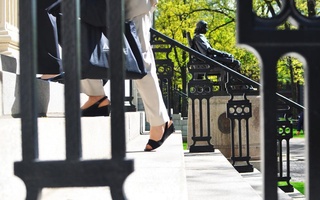{shortcode-2a03a9c12629b437ab5efe1149ddf1048554cc76}
In the Undergraduate Council’s first meeting of the year, newly elected President Gus A. Mayopoulos ’15 and Vice President Sietse K. Goffard ’15 led a discussion Sunday night on the role of the UC as an advocate for students on issues such as referendum action items. UC officers also provided updates on initiatives for the new year, including the delivery of student funds by direct deposit and the creation of a more user-friendly website.
Humorously dressed in a military uniform and equipped with a plastic sword, Mayopoulos openly discussed the relationship between the UC and the student body.
“Everyone knows about this problem the UC has with student communication,” he said.
As one method to bolster the relationship between the UC and the student body, Mayopoulos—formerly the vice presidential candidate on the joke ticket that won the UC presidential election in November—outlined Operation Ghost Protocol, an initiative introduced in an email to the student body earlier this month. The protocol, which mandates UC representatives to be in the dining halls of the house they represent and communicate directly with students, will begin next Friday, he said.
Members then brainstormed ways in which the UC could be perceived as an advocacy group, rather than solely a means of financial support. Many members agreed that the Council should be more visible and launch programs that directly impact students and allow them to voice opinions.
“Are we just going to be the ‘big daddy’ on campus where we’re going to give all our money [to students]?” said Dhruv P. Goyal ’16, Ed ucation Committee chair. “We need to get out of that cocoon of doing things the conventional way.”
In recent years, referendum questions, typically voted on by students during the UC presidential election, have served as potential areas for advocacy from the Council. In legislation passed last spring, the UC adjusted its rules so that the Council is only required to write an official opinion on a passed referendum when half or more of the student population votes. Because less than half of all undergraduates voted in the fall election, the UC is not bound to write opinions for the four referendum questions considered, all of which passed.
Read more in College News
Neil Patrick Harris Named 2014 Hasty Pudding Man of the YearRecommended Articles
-
Open Up the ClubThe United Nations Security Council has chosen its next five non-permanent members, to begin serving next January in the body ...
-
Council To Address Gender ImbalanceAfter a contentious hour-long debate last night, the Undergraduate Council passed legislation that puts forward a series of measures to address the gender imbalance on the Council.
-
Council Allocates Funding for OWAWThe Undergraduate Council allocated $20,000 last night to 35 student-sponsored programs to hold events during Optional Winter Activities Week, the final week before the beginning of the spring semester.
-
City Council Tackles Fare HikesCity Council members debated how to best address the Massachusetts Bay Transportation Authority’s most recent budget deficit at a Cambridge City Council meeting Monday evening. The MBTA has put forward two proposals, both of which include major cuts to MBTA service and sizable fare increases.
-
 At Meeting, Faculty Question Relationship With Administrators
At Meeting, Faculty Question Relationship With Administrators -
A Student on the Council?While we do not believe that students should feel entitled to a seat on the City Council, we are supportive of the idea of student candidates and particularly of candidates who seek to bridge the town-gown divide.













